Paul Saintenoy was a Belgian architect, teacher, architectural historian, and writer.

Parc (French) or Park (Dutch) is a Brussels Metro station on lines 1 and 5. It is located under Brussels Park in central Brussels, Belgium. It has one entrance, at the intersection of the Rue Royale/Koningsstraat and the Rue de la Loi/Wetstraat, two of the main roads of the City of Brussels.

Brussels-Schuman railway station is a railway station in the City of Brussels, Belgium, serving the European Quarter. The station received its name from the aboveground Robert Schuman Roundabout, itself named after Robert Schuman, one of the founding fathers of the European Union, the Council of Europe and NATO.

Jacques Brel is a Brussels Metro station on the western branch of line 5. It is located in the municipality of Anderlecht, in the western part of Brussels, Belgium. The station is named after the Belgian singer, songwriter, and poet Jacques Brel.

Thieffry is a Brussels Metro station on the eastern branch of line 5. It is located in the municipality of Etterbeek, in the eastern part of Brussels, Belgium. It is named after the Belgian aviator Edmond Thieffry.

Pétillon is a Brussels Metro station on the eastern branch of line 5. It is located in the municipality of Etterbeek, in the eastern part of Brussels, Belgium.

Beaulieu is a Brussels Metro station on the eastern branch of line 5. It is located in the municipality of Auderghem, in the south-eastern part of Brussels, Belgium. The station takes its name from the nearby Avenue de Beaulieu/Beaulieulaan.
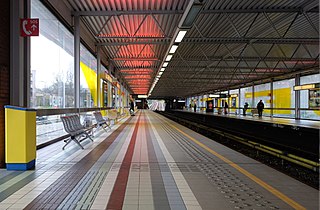
Demey is a Brussels Metro station on the eastern branch of line 5. It is located in the municipality of Auderghem, in the south-eastern part of Brussels, Belgium. It is named after a former Mayor of Auderghem, Gustave Demey.

Herrmann-Debroux is a Brussels Metro station serving as the eastern terminus of line 5. It is located in the municipality of Auderghem, in the south-eastern part of Brussels, Belgium. It is named after the Belgian politician and former Mayor of Auderghem, Carl Herrmann-Debroux.
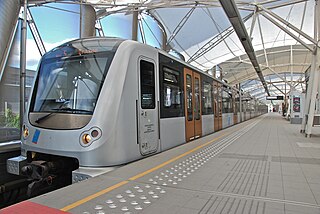
Erasme (French) or Erasmus (Dutch) is a Brussels Metro station serving as the western terminus of line 5. It is located in the municipality of Anderlecht, in the western part of Brussels, Belgium. The station was designed by Philippe Samyn and Partners and is named after Erasmus Hospital, which it serves. It lies at grade and has a single island platform, which can be reached through tunnels under the tracks.
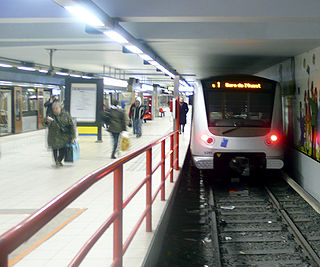
Stockel or Stokkel is a Brussels Metro station serving as the eastern terminus of line 1. It is located in the municipality of Woluwe-Saint-Pierre, in the eastern part of Brussels, Belgium.

Montgomery is an underground station on the Brussels Metro, the first station on the eastern branch of line 1, in the Brussels-Capital Region, Belgium. The station also serves a number of tram lines and buses: Brussels tram routes 7 and 25 pass through, and 39 and 44 terminate there, while tram route 81 and a number of buses stop at surface level.

Joséphine-Charlotte is a Brussels Metro station on the eastern branch of line 1. It is located in the municipality of Woluwe-Saint-Lambert, in the eastern part of Brussels, Belgium. The station is located entirely below the Avenue de Broqueville/De Broquevillelaan. The station, like the green square adjacent to its entrance, is named after Grand Duchess Joséphine-Charlotte of Luxembourg.

Gribaumont is a Brussels Metro station on the eastern branch of line 1. It is located in the municipality of Woluwe-Saint-Lambert, in the eastern part of Brussels, Belgium. It is located under the Avenue de Broqueville/De Broquevillelaan and takes its name from the nearby Avenue Louis Gribaumont/Louis Gribaumontlaan, named after the landowner who helped develop the area in the 1900s.
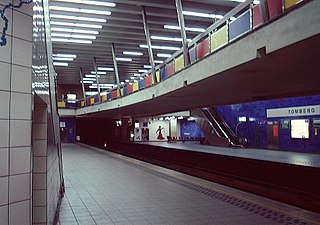
Tomberg is a Brussels Metro station on the eastern branch of line 1. It is located in the municipality of Woluwe-Saint-Lambert, in the eastern part of Brussels, Belgium; one of the entrances of the station is directly beneath the Municipal Hall.

Roodebeek is a Brussels Metro station on the eastern branch of line 1. It is located in the municipality of Woluwe-Saint-Lambert, in the eastern part of Brussels, Belgium. The station serves the Woluwe Shopping Centre and a bus interchange. It takes its name from the nearby Roodebeek Park.

Vandervelde is a Brussels Metro station on the eastern branch of line 1 It is located in the municipality of Woluwe-Saint-Lambert, in the eastern part of Brussels, Belgium. It is named after the Avenue Émile Vandervelde/Émile Vanderveldelaan, which it serves.
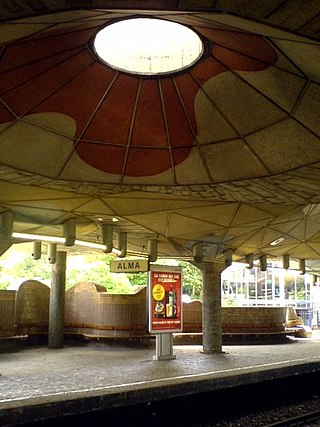
Alma is a Brussels Metro station on the eastern branch of line 1. It is located in the municipality of Woluwe-Saint-Lambert, in the eastern part of Brussels, Belgium, serving the Brussels-Woluwe campus of the University of Louvain (UCLouvain). Designed by Lucien Kroll as a total artwork, it takes its name from its location on the Place de l'Alma/Almaplein, the university campus' main square.

The Old England department store was a large retailer in central Brussels, Belgium, partially housed in a notable Art Nouveau building constructed in 1899 by Paul Saintenoy out of girded steel and glass. Nowadays, its former buildings house the Musical Instruments Museum (MIM), founded in 1877, which forms part of the group of Royal Museums for Art and History (RMAH).


















